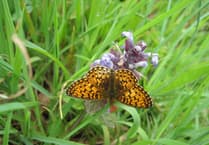SOUTH West Water is confident there will be no need for hosepipe bans in either Devon or Cornwall this year, even if there are prolonged periods of hot and dry weather.
In 2022, a hosepipe ban was put in place in Cornwall and parts of North Devon after the biggest drought in the region for over 130 years. This was extended to other parts of Devon in 2023.
Since then a combination of record-level investment, periods of heavy rainfall and customers doing more to save water, has seen a boost in reservoir levels across the South West, the water company says.
Last week, SWW announced its two biggest strategic reservoirs – Roadford Reservoir in Devon and Colliford Reservoir in Cornwall – have both recharged to more than 90per cent storage capacity.
To help maintain strong water resilience now and in the future, SWW is investing more than £125 million to increase resources in Devon by 30per cent.
Roadford Reservoir is now at 100per cent storage compared with 68per cent this time last year, while Colliford Reservoir is at 98.5per cent compared to 60per cent last year.
David Harris, South West Water’s Drought and Resilience Director, said: ‘While it may seem obvious that recent heavy rainfall has led to increased reservoir levels across the region, over one-third of the additional storage has come from our own supply interventions and customers reducing their own usage.
‘As a direct result of our investments, interventions, the weather and our customers reducing their use of water, we are confident that we are in a strong position to navigate whatever weather we face this year without the need for water restrictions.
‘This does not mean we will stop our efforts there, we will continue to invest and deliver clean water supplies across our region and prepare as much as we can for climate change and unpredictable weather patterns.’
South West Water’s Water Resources Management Plan is looking 25 years ahead to make sure there is secure, sufficient and safe supply of water for everyone, while guaranteeing the environment and the wildlife that live here are not just protected but can thrive.




